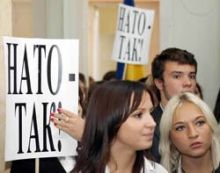Ukraine’s pro-European choice is beyond doubt now. However, we have to take a series of well-thought-out and consistent steps that will lead to our EU membership.
One of these steps is Ukraine’s NATO membership. At present, opponents of our country’s movement in this direction are trying to split these two memberships — the EU and NATO. However, the experience of European countries, in particular Bulgaria and Romania, shows that these two integration processes are inseparable.
In the opinion of analysts at the Euro-Atlantic Cooperation Institute, Bulgaria’s experience is didactic for Ukraine because our current processes and urgent problems are very similar to the situation in Bulgaria in the late 1990s and at the beginning of the new millennium.
“Our difficulties are nearly a perfect match,” says Oleksandr Sushko, head of the Euro-Atlantic Cooperation Institute. “These include a lack of consensus in society and the political elite, inefficient reforms, a high level of corruption, and rampant organized crime. Nevertheless, Bulgaria is now in NATO and the EU, while we are in the gray zone. Our neighboring country was invited to join NATO in 1997, which it did in 2004. Nearly all experts concur that the cause for this progress in Bulgaria is that it was able to solve the main task: their political elites had reached a consensus on the country’s strategic future.”
“Ukraine’s and Bulgaria’s experiences are very much alike because we have a common foundation, which is post-Communist society. In the 1990s the topic of NATO membership was very unpopular in Bulgaria, even more so than it is in Ukraine now (Ukraine’s NATO membership is supported by 30 percent of Ukrainians.—Author). The same is true of Bulgaria’s entry into the EU: supporters of European integration outnumbered proponents of NATO membership. The causes behind this situation were the same as in present-day Ukraine: at the time, NATO had an image of an aggressive bloc in Bulgaria, which was a result of Communist propaganda,” says Svetoslav Malinov, a Bulgarian MP and a member of the program and supervisory board at the Bulgarian School of Politics. “When we were fighting for public opinion, it was very important to have a concept of parallel membership—in the EU and NATO. We explained to people that our NATO membership is a prerequisite to our EU membership, although our opponents tried to split them in the consciousness of the people.
“We also used the popular idea of common future with Europe, transposing it to the idea of NATO membership: we needed this for economic growth, enhancing the country’s security, and cutting military expenditures. We also explained to businesses that NATO membership will be a signal of the country’s stability, thus bringing investments to the country.”
Bulgarian politicians remember that it was due to the political consolidation of 1999 that they were able to change public opinion: Bulgarians trust only those politicians who can agree among themselves to work for the prospects of the country.
Most importantly, the expectations of the Bulgarian Euro-Atlantic supporters came true, although it took several years, rather than a month or a two. Experts underline that even figures point to this: for example, between 1997, the year when Bulgaria declared its intention to join NATO, and 2004, when it entered the Alliance, investments into the country increased 5.7 times, accompanied by significant GDP growth. Even though European analysts believe that corruption and organized crime are still quite widespread, while the judicial reform is making too little progress, the country has a vision of the prospects of its developments for decades ahead. The reason is, experts say, the quality of the political elite. Therefore, NATO membership became for Bulgaria the foundation based on which the country has preserved its identity.
“The current situation in Ukraine is not drastically different from the situation in Bulgaria at the turn of the millennium. However, unlike our neighbors, we are not implementing reforms that are necessary for NATO membership. As long as the country does not see a rotation of political elites, we cannot speak seriously about a shift in our citizens’ attitude to NATO,” says Sushko.
Oleksii Haran, a professor at Kyiv Mohyla Academy, agrees with the statement:
“What is different between us and Bulgaria is that even at the time of Communist propaganda Europe considered Bulgaria, Romania, former Czechoslovakia, and some other countries to be “European” countries. In contrast to this, Ukraine has had to spend a lot of effort to prove that it is not Russia. Even now certain European experts say that Ukraine is [part of] Russia’a sphere of influence.
“That is why we need to do the work inside the country, above all else: we need unity of the political elites, although I doubt that this will be an accomplished fact because we are facing elections next year. For this reason it is very difficult to find unity on geopolitical issues against this background. Nonetheless, Ukraine needs to continue the informational campaign. There are widespread stereotypes in the country that Ukraine is imposing the pro-NATO view on its citizens, but in reality, the Russian view that the bloc is harmful is very popular in our country. This is because people watch Russian TV channels. Moreover, Ukrainian channels offer the Russian point of view without any comments—it is easier this way.”
Analysts believe that ways of fighting for public opinion need to be constantly improved. For example, billboards with Viacheslav Kyrylenko and the inscription “NATO — yes!” would have been very appropriate in 2005, when the president’s rating was 70 percent. Now we need to come up with something different, because the credibility of information offered by a politician hinges on his or her popularity.
Despite all this, Ukrainian experts and their Bulgarian colleagues believe that Ukraine already has the foundation on which to shape public opinion: 30 percent of Ukrainians are in favor of NATO membership.







